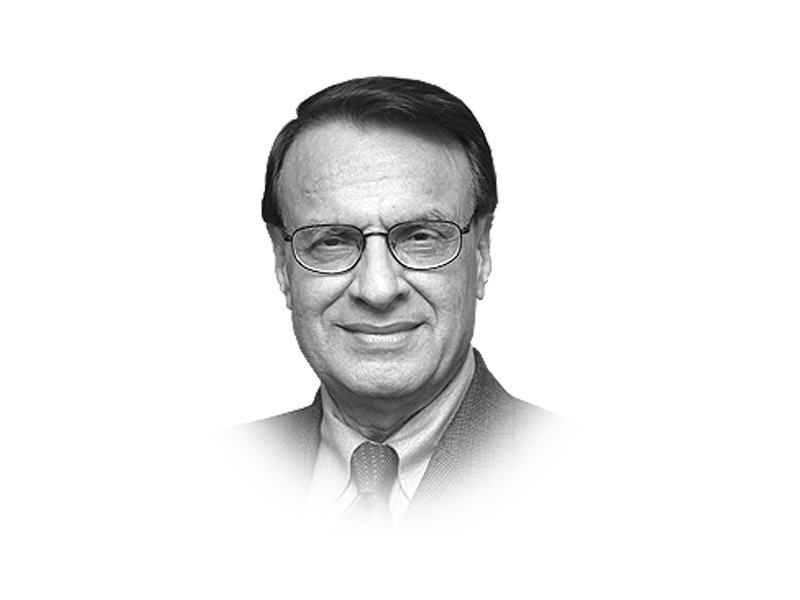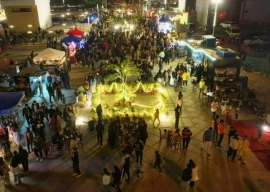
But in our country, when it comes to choosing our leaders, we are invariably influenced by our mundane loyalties rooted in our feudalised political structure and societal factional system. No wonder, it is the people, not the rulers who will be on trial today. If history is any lesson, only a miracle will bring the change that we have been so desperately looking for since our independence. Unfortunately, ours is the story of a society that has been going round and round in aimless circles for 65 years. Absence of democracy, rule of law and good governance has been its running theme.
Instead of removing our systemic weaknesses and reinforcing the unifying elements of our nationhood, politicians have always succumbed to narrowly-based self-serving temptations. They rejected the popular will freely expressed in the December 1970 elections, and instead of exploring political remedies to the resultant crisis, went along with a military solution. The real Pakistan disappeared with its tragic dismemberment. And yet, we learnt no lesson from our mistakes. We are repeating the same mistakes.
Our problem is that the overbearing feudal, tribal and elitist power structure in Pakistan has been too deeply entrenched to let any systemic change take place. It doesn’t suit the politicians. They make amendments in the Constitution for self-serving reasons only. The main casualties have been the state institutions and the process of national integration. The country has still not been able to evolve a political system that responds to the needs of an ethnically and linguistically diverse population.
In today’s context, our country’s peculiar socio-economic and political culture, based on feudal and tribal structure, high rate of poverty and illiteracy, and inequality of wealth and power are symptomatic of a lopsided situation that warrants the beginning of an end to the current socio-economic disparities and political exploitation of the people by the privileged few of our country. This requires a holistic systemic change in our governance patterns.
The need for drastic change in our present anachronistic set-up is urgent to get rid of the same old usurpers of the country’s politics, outmoded social and political structures and elitist-led status quo in our country. But sometimes, when the gravest of problems stare us in the face, we choose to ignore them just because we find that we can’t do anything about them. And in most cases, we just ignore them and carry on with life, at times even ridiculing those who speak of the need to set things right.
As a country and as a nation, at this critical phase in our history, we cannot just leave ourselves to the vagaries of time or at the mercy of our corrupt and incompetent rulers. We can’t even innocently continue to believe that everything will be alright, magically or providentially. We are currently going through the worst governance crisis of our history. The gross inadequacies in governmental handling of serious problems affecting the common man, including unprecedented food and energy shortages, unabated violence and countrywide lawlessness, have never been so acute.
Our rulers have been amply tested and inspire no hope. The nation desperately looks for an alternative, someone with integrity and credibility and a well-defined blueprint with an able team to remake the state of Pakistan. But given our pathetic performance in our political conduct and discipline since our independence, we, like most developing countries, are perhaps not yet fit for the parliamentary system. Britain struggled for centuries to reach its current parliamentary status. For us, it would be too long and too arduous a journey to be indefinitely chasing illusory goals.
Temperamentally, we are a ‘presidential’ nation. It is time we abandoned the system that we have never been able to practice, and explored an adult franchise-based ‘presidential system’ suitably designed for and tailored to Pakistan’s needs. We must also adopt the system of ‘proportional representation’ that ensures representation of political parties in national legislature proportionate to the percentage of popular vote they receive. It will provide greater access to non-feudal, non-elitist educated middle class people in elected assemblies.
Also needed is rationalisation of our federal system by revisiting our current ‘provincial architecture’ looking for a pragmatic solution to the problems of regional disparities. Our Constitution does not provide a solution to the genuine concerns on the inequality of the size of provinces and lopsided sharing of political and economic power. Our present provincial set-up has long been the cause of political instability, with an ever-looming threat to the country’s very survival. It is not only fueling misrule and corruption but also aggravating the sense of inequality and deprivation among different parts of the country.
Lately, there have been demands for more provinces on ethnic or linguistic grounds. If this trend were to continue, we will be left with a loosely wired skeleton of a federation, with self-serving disgruntled and corrupt politicians continuing to play havoc with this country. The solution lies in appropriately recasting our federal architecture by redesigning the existing four provinces as states with a constitutionally redefined role and status and dividing them into administratively-determined provinces with no cabinets, chief ministers, assemblies or secretariats. The purpose should be to separate governance from ethnic-linguistic considerations and to eliminate a known tier of redundancy and dirty politics.
We must remember that the Pakistan of 1947 could not survive even for 25 years. Despite the 1973 Constitution, the remaining Pakistan continues to face the threat of further disintegration, mainly due to unaddressed concerns of different regions. To avert the vicious cycle of known tragedies, we need a serious and purposeful national effort involving a holistic review of our governmental system and a parallel discourse among major political stakeholders and key civil society segments, including the media and lawyer’s community, to explore and evolve a national ‘remedial and recovery’ plan before it is too late. Elections alone will not make any difference. The system itself must change.
Published in The Express Tribune, May 11th, 2013.
COMMENTS (13)
Comments are moderated and generally will be posted if they are on-topic and not abusive.
For more information, please see our Comments FAQ
1732099866-0/adele-(3)1732099866-0-405x300.webp)












@the Skunk: Yes, four years presidential term is enough and what would you say that after every four years of rule there should be an interim government for a year to make sure that the next elections are fair, free, and transparent? And, should the interim set-up have the authority to clean up after every four years?
@observer: NOT POSSIBLE. Let us be practical about what we want. The present system should be 'presidential' and a term of four (4) years is sufficient. The effect of short and medium policies is felt within one to two years. There should be more provinces for satisfactory implementation of development funds and a constitutional watchdog should evaluate their application.
WHO WILL CHANGE THE SYSTEM? MAN. It is the faces that change a system and bring in a new one. The old faces continue with the old self-serving rules. Quote: "Man, the living creature, the creating individual, is always more important than any established style or system." Bruce Lee (Brainyquotes). Salams to Pakistan
Appreciating the write-up, I would also request the writer to provide us with blue print of how to achieve a Presidential system with direct franchise and how to reign in/mitiagate/eliminate feudalism?
It is ironical that all the people are harping over a democratic system of governance but dont give a damn about good governance...Elections / Voting are being labelled as only criteria for Democracy...and it is prevalent both in India and Pakistan. Politics are no different in both the country. What made the country(India) avoid dictatorship is its sheer size and population. Other wise both the countries have same evils ..on socio-political level. It reminds me an old saying...."IN A TYRANNICAL RULE AN INDIVIDUAL MAKES FOOL OF THE PEOPLE WHERE AS IN A DEMOCRACY ..A GROUP OF PEOPLE MAKE FOOL OF THE MASSES."
Excellent analysis.
@mahmood: The author, Shamshad Ahmad, has let us know all that is wrong with the existing system. He has even been constructive enough to offer solutions. One step more was needed - listing how many ways his solutions can be made to fail. Mahmood Sahib, you have touched the core of the issue, neatly and precisely - it is not the 'system' that is central to the issue, it is the intent.
"Despite having the best chance to do this, the dictators did not even make an attempt at it"
So how will Pakistan capture, or recapture, the old ideals? When it is done, let the world know. Who knows, your method may work elsewhere, too!
A. Temperamentally, we are a ‘presidential’ nation.
B. The solution lies in appropriately recasting our federal architecture by redesigning the existing four provinces as states with a constitutionally redefined role and status and dividing them into administratively-determined provinces with no cabinets, chief ministers, assemblies or secretariats.
So, in one sentence-
Bring back the One Unit under Field Marshal President.
As if once was not enough.
The central thrust of this article cannot be avoided. In a geopolitical vein, Asimov, the researcher with French academy, has come up with a neat analysis for Pakistani elections. Have a look: http://asimovarifov.wordpress.com/2013/05/09/elections-in-pakistan-a-trajectory-for-gen-kayani/
@mahmood: Dear mahmood, Extremely well written. The only comment I can add is that every country in the world is very similair. One can change governments, but all we get is little people in charge who have no vision, and are faced with the problem of a hostile opposition.. Regardless of who gets elected Pakistan should not expect any great changes.
Parliamentary Democracy is nothing more than a ritualistic worship of democratic superficialities, benefiting the politicians and their families. The political parties are owned by families. It is political monarchy in Pakistan in the name of democracy. It has never been meant for the good of common people. What motivates a politician to spend millions to get elected, is it really to serve the people? What use are elections if the same flock of plunderers, looters and incompetents who only care for their own little power centers are returned? So, why go through with a useless exercise and ask for worse? Pakistan has been shocking itself since its inception with all possible forms of Governments. If Pakistan is to be at peace with itself, its Salvation lies in a Presidential form of Government, where the candidate for the highest office stands for a direct election. This ‘Westminster’ version of “democracy”, has not delivered in the past, present, and will never be able to deliver in the future. This 'Democracy’, which sends to the assemblies candidates winning from a few thousand votes, of dubious authenticity, from some captive constituencies, will always create the collations of the Incompetent & Corrupt to indirectly ‘elect’ persons of the caliber of Asif Ali Zardari and Raja Pervaiz Ashraf to the highest offices. This is a sick joke, and stretching it for five years is just unbearable, in every sense of the word. This system needs to be buried at its rightful place-------“”Ghari Khuda Baksh””.
After reading the ideas stated in this article I am convinced that it is due the mind-set of our ICS-based top civil servants that Pakistan is in such a precarious situation. Shamshad Ahmed is one of those civil servants. He says we should have smaller provinces without CMs and Assemblies. Probably he wants to put Political Agents as head of the provinces or governors appointed by the President. All Pakistan needs is self-governments at local level with local administration and local police that are independent of the provincial control. No DMGs at local level. Reform police so that hiring is only at lower level and no direct ASIs and PSPs. Pakistan has big problems that can be remedied by these two small steps.
One reason the Army was welcomed three separate times by the people was the expectation that, being answerable to no one, the army would face no obstacle in setting things right. Some of these expectations were that the military dictators (Ayub, Zia, Musharraf), being dictators, would, with one stroke of the pen, eliminate the feudal system, put in place the most suitable representation system (parliamentary/presidential/whatever), replace the thana/kuchery/patwari system with its modern equivalent, reform the police, establish a holistic accountability system, and reform the judicial system. Despite having the best chance to do this, the dictators did not even make an attempt at it. On the contrary they exacerbated the above problems. They simply abused the omnipotence the people had granted to them, until all three were eventually kicked into oblivion.